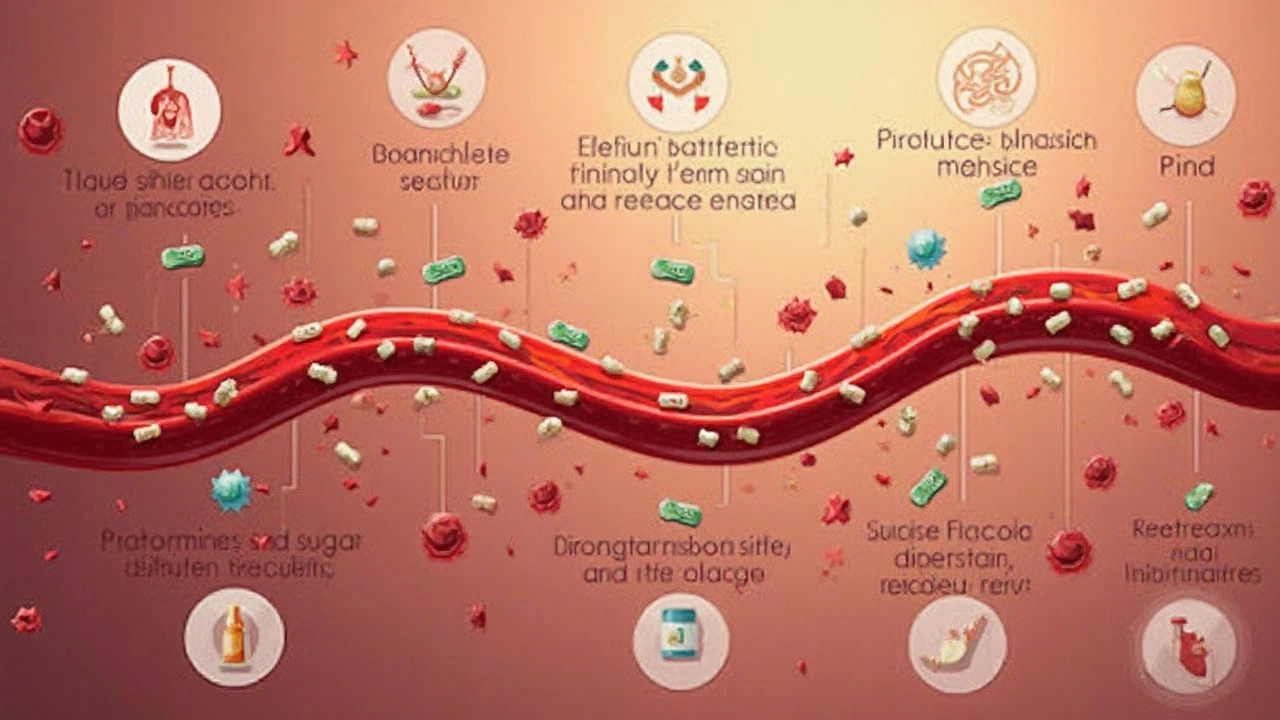Start googling diabetes medications and you’ll see metformin’s name everywhere. If you’ve just been diagnosed with type 2 diabetes, chances are your doctor will bring it up in your first conversation. It’s not a random pick—metformin really is the go-to for most people starting treatment.
But why does metformin get all the attention? For starters, it’s been around for decades, so doctors know it inside out. It usually doesn’t cause weight gain (a big deal with diabetes meds), and it isn’t linked to low blood sugar crashes like some other options. Plus, it’s cheap, so you won’t need to empty your wallet every month.
If you’re nervous about side effects, here’s the good news: most people don’t get anything worse than an upset stomach when they start metformin, and even that usually goes away with time. Want to make it easier on your tummy? Taking the pill after you eat often helps, and there are special “extended-release” versions if you need them.
- Why Metformin Comes First
- How Metformin Actually Works
- Common Questions About Metformin
- Other Medications: When and Why
- Tips for Starting Your Medication Journey
Why Metformin Comes First
If you ask any diabetes specialist about the first drug of choice for diabetes, metformin is almost always the answer—especially for type 2. There’s a pretty straightforward reason for this: it works, it’s safe, and it rarely causes major problems.
Metformin has a reputation for being reliable. It’s been on the market since the 1950s, which means doctors have decades of info on what it actually does. It lowers blood sugar mostly by stopping the liver from dumping too much glucose into your blood—without forcing your pancreas to work overtime.
Here are the key reasons why metformin is usually the first prescription for adults with type 2 diabetes:
- Proven Results: Studies show that metformin can lower HbA1c (which is your average blood sugar over 3 months) by about 1% to 1.5%. That’s enough to make a real difference for most people.
- Low Risk of Hypoglycemia: Unlike some other diabetes medications, metformin almost never causes dangerously low blood sugar. This is a huge relief for a lot of people managing diabetes.
- No Weight Gain: In fact, some folks even lose a couple pounds on metformin. Compared to other drugs that might make you gain weight, this makes it way more appealing for daily life.
- Cost-Effective: Metformin is available as a generic, so it usually costs just a few bucks per month, even without fancy insurance.
- Safe for the Long Haul: Side effects tend to be pretty mild, mostly tummy troubles at first, and nothing long-term if you’re otherwise healthy.
Curious about just how common metformin use is? Take a look at the quick snapshot below:
| Country | % of People with Type 2 Diabetes on Metformin |
|---|---|
| USA | ~80% |
| UK | ~84% |
| India | ~75% |
If you’re diagnosed with type 2 diabetes, the odds are high you’ll start your journey with metformin. It’s got just the right mix of effectiveness, safety, and affordability to make it the default choice.
How Metformin Actually Works
Let’s get straight to it—metformin helps lower blood sugar in three big ways. First, it nudges your liver to stop pumping out so much sugar into your blood. That’s a lifesaver, because your liver can actually make blood sugar levels spike, especially overnight or between meals.
Second, metformin makes your cells more sensitive to insulin. If you have type 2 diabetes, your body’s insulin isn’t doing a great job of letting sugar into your cells. Metformin helps fix that problem, so your body uses its own insulin better.
Third, this drug also slows down how much sugar your gut absorbs from food. That means those blood sugar spikes you get after eating a big meal are less of a thing.
- Metformin doesn’t force your body to make more insulin on its own. That’s partly why it usually doesn’t cause those scary low blood sugar episodes.
- Most people see their A1C (the big-picture blood sugar test) drop by about 1% to 2% after a few months on metformin. That’s good going for a single drug.
- It also sometimes helps with a little weight loss, which can make diabetes easier to manage.
You might wonder if there’s a catch. Honestly, metformin has been around for over 60 years and is one of the most studied diabetes meds. Doctors trust it because it works for most folks, and it’s a solid pick for the first drug of choice for diabetes.
| Effect | Result |
|---|---|
| Less glucose from liver | Lower fasting blood sugar |
| Better insulin sensitivity | Body uses insulin better |
| Slower sugar absorption in gut | Smaller post-meal spikes |
If your doctor talks about metformin, you now know it's working behind the scenes on a few different levels. That multitasking is a major reason it keeps its spot at the top of the diabetes medication list.

Common Questions About Metformin
People hear about metformin and instantly have questions—some simple, others surprising. If you’re confused, let’s clear things up by tackling the questions that come up most around this first drug of choice for diabetes.
Will metformin cure my diabetes? Nope. Metformin helps you manage type 2 diabetes by lowering your blood sugar, but it doesn’t actually fix the root cause. Some folks can stop metformin after big lifestyle changes and weight loss, but that’s the exception, not the rule.
What should I expect from side effects? It’s super common to feel some stomach issues at first like nausea, bloating, or diarrhea. Most people’s bodies get used to metformin over a few weeks. Starting with a low dose and taking it after food makes it easier on your stomach. There’s also an extended-release (ER) version that’s easier for a lot of people.
- About 1 in 10 people stop metformin due to stomach issues.
- Switching to ER metformin helps most of them stick with treatment.
Is metformin safe to take long-term? Yep—doctors have used it since the 1950s. It’s one of the most studied drugs out there. Side effects like lactic acidosis are rare (only about 3 to 9 cases per 100,000 people per year), especially if your kidneys work fine.
Can I mix metformin with other medications? Most of the time, yes. If metformin alone isn’t enough to keep your blood sugar in check, your doctor might add another diabetes medication. Make sure your doc checks for kidney problems, though, since that’s one thing that can make metformin risky.
| Fact | Details |
|---|---|
| How often do I take it? | Usually once or twice daily with food |
| Do I need to check my blood sugar all the time? | Not unless you're on other medications that can cause lows |
| Is weight gain a problem? | No, metformin is weight neutral or may cause slight weight loss |
If you’re ever unsure, ask your health team. They’ve heard it all—trust me.
Other Medications: When and Why
So, what if metformin doesn’t cut it? Or maybe it just doesn’t sit well with you. You’re not stuck—there are plenty of backup options when it comes to diabetes medication. Doctors usually add or swap meds if your blood sugar doesn't respond well enough, or if you get side effects that just aren’t worth it.
Here’s a quick rundown of what might come next:
- Sulfonylureas: Old but reliable, these meds force your pancreas to make more insulin. Downside? There’s a risk of low blood sugar and sometimes a bit of weight gain.
- DPP-4 inhibitors: These are newer, work gently, and usually don’t cause weight gain or blood sugar crashes. They have names ending in “-gliptin.”
- SGLT2 inhibitors: These meds help you pee out extra sugar. They can even support heart and kidney health, which is huge if you’ve already got issues there. Popular choices are empagliflozin or canagliflozin.
- GLP-1 receptor agonists: Think Ozempic. These shots do double duty—they lower blood sugar and often help with weight loss. They can upset your stomach, though, and tend to be pricey.
- Insulin: If oral meds don’t work, or your sugars are sky-high, sometimes there’s no choice but to go with insulin. It sounds scary, but it’s a lifesaver for many people.
Doctors make switches or add-ons based on blood sugar numbers, other health issues, and yes, even insurance coverage. For example, if your kidney function isn’t great, SGLT2 drugs often get the nod because of those kidney perks.
| Medication | Chance of Hypo | Weight Impact | Other Perks |
|---|---|---|---|
| Metformin | Low | Neutral/Loss | Cheap, long history |
| Sulfonylureas | High | Gain | Inexpensive |
| DPP-4 Inhibitors | Low | Neutral | Few side effects |
| SGLT2 Inhibitors | Low | Loss | Heart/kidney support |
| GLP-1 Agonists | Low | Loss | Weight loss, heart support |
| Insulin | Varies | Gain | Most effective |
Whatever your doctor suggests, don’t panic if the plan changes. Diabetes treatment is rarely one-size-fits-all. Your own numbers, budget, and even your daily routine help decide which diabetes medication could work best next.

Tips for Starting Your Medication Journey
Kicking off treatment for type 2 diabetes with metformin can feel like a big step, but there are a few straightforward things you can do to make it work better for you. These tips keep daily life as smooth as possible while managing your blood sugar.
- Start low, go slow: Most doctors will suggest beginning with a low dose. Jumping straight to a full dose might cause more stomach trouble, so easing in gives your body time to adjust.
- Take it with meals: Swallow your metformin during or after eating to cut the risk of an upset belly. It’s an easy fix for one of the most common issues people have at first.
- Don’t miss doses: Skipping your prescribed meds can mess with your blood sugar control. Set reminders on your phone, or line up your pills near your toothbrush – whatever works for you.
- Watch out for side effects: Diarrhea, nausea, or gassy feelings aren’t unusual at the start, but they usually calm down in two weeks. Let your doctor know if you can’t shake these issues; sometimes the extended-release version does the trick.
- Keep up with blood tests: Metformin is super safe for most people, but occasional bloodwork for kidney function and vitamin B12 keeps you out of the danger zone. Bring it up at your regular checkups.
- Combine with lifestyle changes: No med (even the best diabetes medication) can do it alone. Pair your pills with more movement and better eating for the biggest pay-off. Even small wins, like losing 5% of your weight, can seriously help your blood sugar.
Not sure what to expect? Here’s a quick look at what most people deal with, based on actual stats:
| Side Effect | How Many Folks Notice It |
|---|---|
| Upset Stomach | ~25% |
| Diarrhea | ~20% |
| Loss of Appetite | ~7% |
| Vitamin B12 Drop | Up to 10% |
If you ever feel lost or something just feels off, don’t tough it out. Reach out to your doctor or diabetes nurse. They’ve seen every question about type 2 diabetes treatment and know all the workarounds. You’re not on this ride alone.








